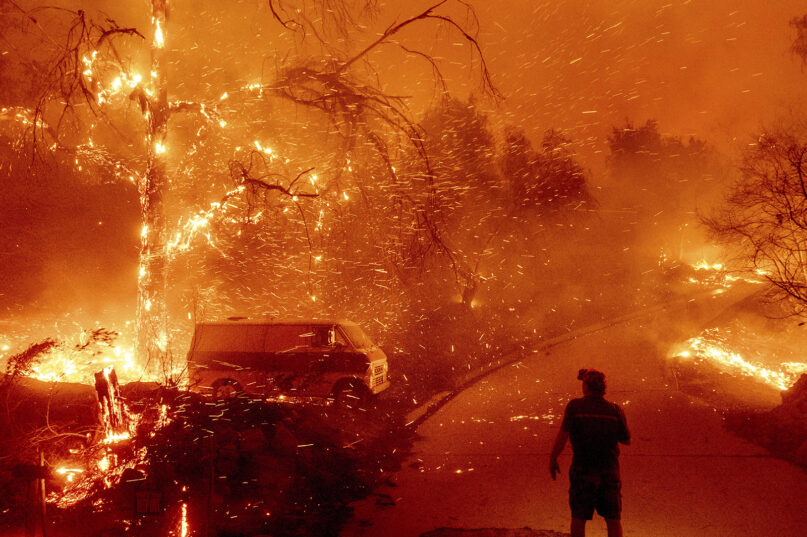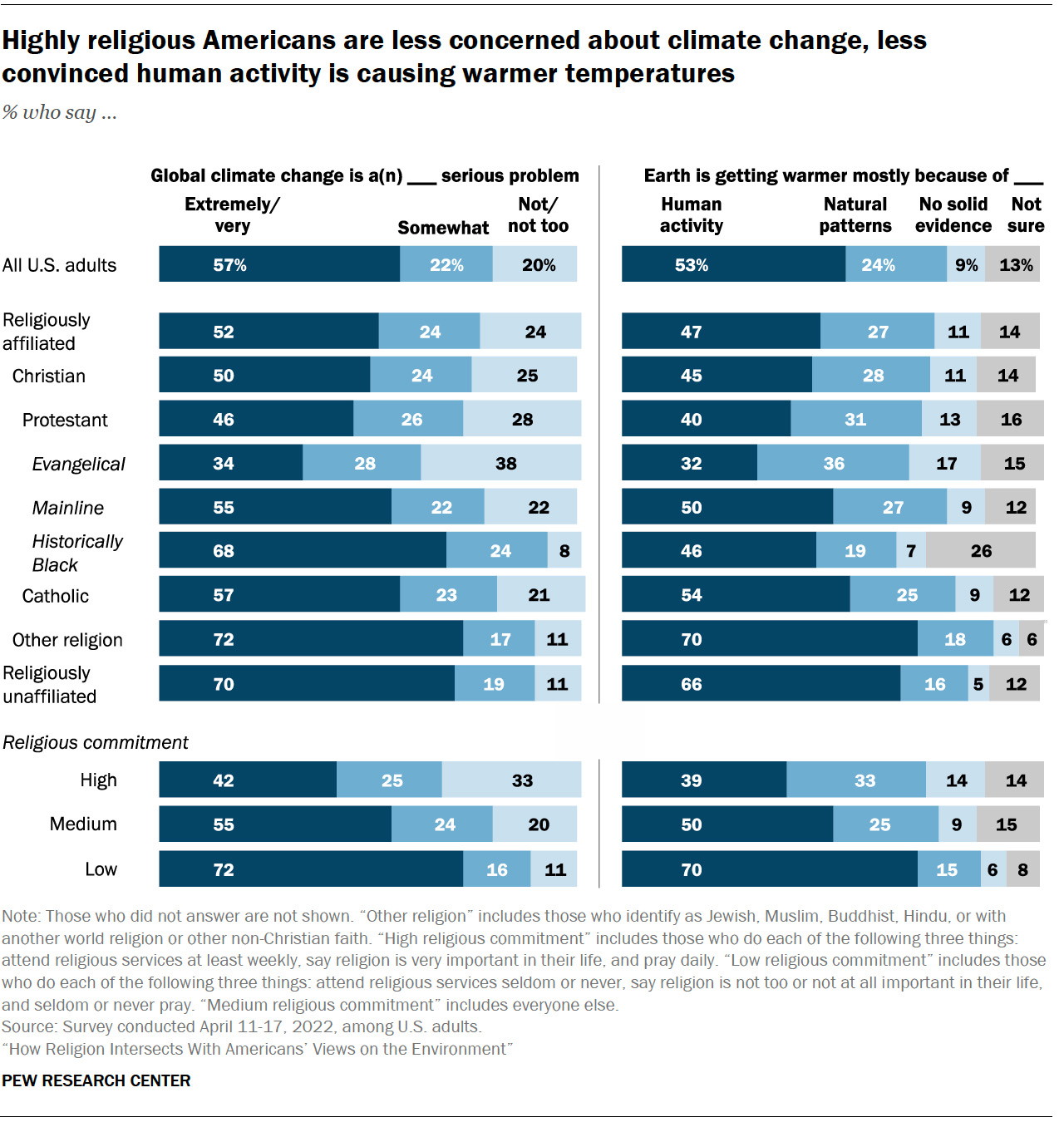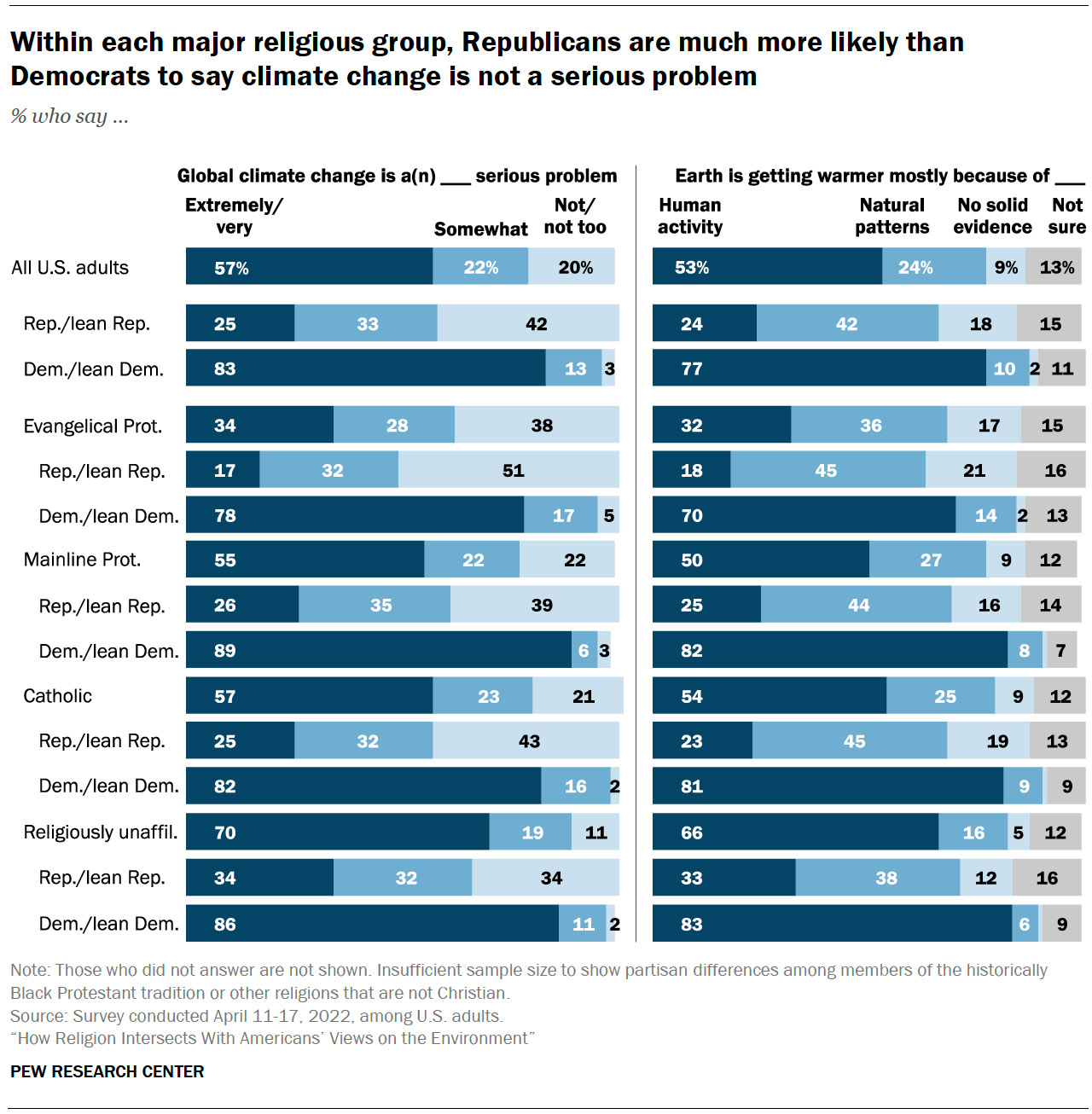Poll: Politics drives religious Americans’ views on the environment
Religious people who lean Republican are less inclined to be concerned about global warming than people of the same religion who identify or lean to the Democratic Party.

(RNS) — Many reasons have been suggested as to why highly religious Americans are less likely to be worried about climate change or work to try to stem it. But in the end, a new Pew Research survey concludes, it’s all about politics.
“The main driver of U.S. public opinion about the climate is political party, not religion,” the survey of 10,156 Americans concludes.
Republicans are far less likely than Democrats to believe human activity is causing global warming or to consider climate change a serious problem. The same is true for the religious among them: Religious people who identify or lean Republican are less inclined to be concerned about global warming than people of the same religion who identify or lean to the Democratic Party.
Take evangelicals as an example — a group with a reputation for denying the dangers of climate change — 34% of evangelicals say climate change is an extremely or very serious problem. But if you break evangelicals down by political party, a bipolar picture emerges: 78% of evangelicals who lean Democratic say climate change is an extremely or very serious problem, compared with 17% who lean Republican.
The survey shows the same consistent pattern, if not quite as extreme, among other religious groups, including mainline Protestants, Catholics and even the religiously unaffiliated. In every group, the Democrats among them are significantly more likely to be concerned about climate change. The same is true when asked about the cause of climate change: Democrats in each group are much more likely than Republicans to lay the blame on human activity, regardless of religion.
These massive gaps in views among people claiming the same religion points to political partisanship as the crucial factor driving these opinions.
The study also shows a gap between those with high, medium and low religious commitments. The higher the religious commitment, the less likely to be concerned about climate change — and the more likely to identify with the Republican Party, according to the report.
While more than half of Americans believe the Earth is getting warmer because of human activity, only 39% of highly religious Americans — those who pray daily, attend religious services regularly and say religion is very important to their lives — agree. By comparison, 70% of those with a low religious commitment believe the Earth is getting warmer because of human activity, the survey found.

“Highly religious Americans are less concerned about climate change, less convinced human activity is causing warmer temperatures” Graphic courtesy of Pew Research Center
Other theories for why highly religious Americans are less concerned about the environment — there are much bigger problems in the world today; God is in control of the climate; the end times are near, why worry? — were not as salient.
RELATED: Evangelical group releases climate change report, urges a biblical mandate for action
The survey found only a modest relationship between end-times beliefs and concerns about climate change. Those who say the “end times” are coming soon are less likely to think climate change is an extremely or very serious problem compared with those who do not believe the end times are near (51% vs. 62%) .
Overall, 57% of Americans believe climate change is an “extremely or very” serious problem.
Evangelicals are the only religious group in which a majority (66%) say stricter environmental laws and regulations will hurt the economy. It’s almost the reverse among unaffiliated Americans, 68% of whom don’t believe stricter environmental laws will hurt the economy.
The survey also found that climate change is not a topic discussed much in religious congregations. Only 8% said they heard a great deal about it in sermons; 70% say they hear little or nothing about it.
About half of Americans take steps to protect the environment, like reducing food waste, using fewer plastics, driving less or eating less meat. Here too, evangelicals scored lowest on these efforts, especially eating less meat.

“Within each major religious group, Republicans are much more likely than Democrats to say climate change is not a serious problem” Graphic courtesy of Pew Research Center
And, the survey found, religiously affiliated Americans are less likely to be civically engaged in combating climate change — donating money to environmental groups, volunteering with such groups or attending protests.
Among Americans who attend services at least once a month, 46% said their religious congregation has recycling bins; 43% said their congregation has taken efforts to be more energy efficient. Only 8% in this group said their congregation relies on solar energy.
Americans, regardless of religious affiliation, don’t view efforts to reduce carbon emissions in moral terms. Only 10% of U.S. adults — including 8% of those with a religious affiliation — say it is morally wrong to drive a car that gets poor gas mileage.
The margin of error for the survey was plus or minus 1.6 percentage points.
RELATED: Poll: Nearly half of Americans think the US should be a Christian nation
No comments:
Post a Comment